5 Nursing Campuses,
1 WVU School of Nursing.
Whether you are interested in earning your first degree or advancing your field of knowledge at the graduate level, the WVU School of Nursing has a program for you on one of our five campuses.
Morgantown Campus
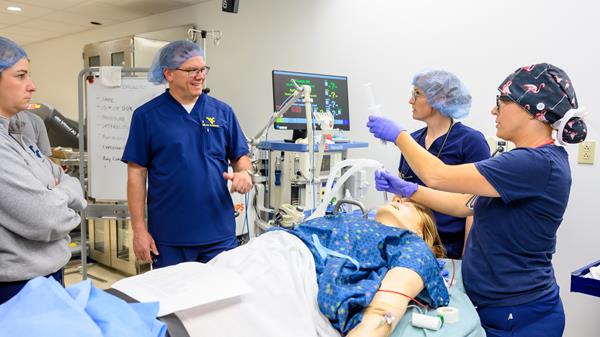
Students at the Morgantown Campus have access to WV STEPS, a state-of-the-art simulation facility.
One of three campuses in Morgantown, the Health Sciences Center is the primary teaching and research center for the health professions schools. The campus also includes Ruby Memorial Hospital and other clinical facilities associated with WVU Medicine, all of which serve as teaching locations for our students. The Centers for Disease Control and Prevention operates a major occupational health research facility on this campus.
Programs offered at the Morgantown Campus
Accelerated BSN (ABSN)
The ABSN program is an accelerated program for college graduates who wish to become a registered nurse with a bachelor's degree in nursing. The program, offered on the Morgantown and Bridgeport campuses, is designed for full-time study. After 18 months of continuous enrollment, successful students obtain the Bachelor of Science in Nursing degree (BSN) and are eligible to take the licensing examination for a registered professional nurse (RN).
Bachelor of Science
The Bachelor of Science in Nursing (BSN) program is recognized by health care agencies as providing students with excellent preparation for the nursing profession. Graduates are in great demand and enjoy a large number of career opportunities. Our BSN pass rates for first-time test takers on the national licensure exam in 2023 was 100%.
Master of Science in Nursing
The MSN programs at WVU offer baccalaureate-prepared nurses the opportunity to earn a master's degree with part-time or full-time curriculum options. Our current program includes a master’s degree in the FNP (family) nurse practitioner specialty track.
Doctor of Nursing Practice
The WVU School of Nursing Doctor of Nursing Practice (DNP) program prepares nurses to practice at the highest level of professional nursing. Graduates of the DNP program advance the application of nursing knowledge through the translation and implementation of evidence for practice to improve health outcomes for diverse populations. This expert level practice builds on past advanced practice education, experience, and certification. The DNP program can be completed in as few as 32 credit hours.
DNP Nurse Anesthetist
This accredited, hybrid curriculum prepares the student nurse anesthetist for certification in nurse anesthesia and will confer a Doctor of Nursing Practice (DNP) degree. A student enrolling in this major can expect a rigorous, challenging program of study, heavily based in sciences including anatomy, physiology, pathophysiology, pharmacology, chemistry, and physics. This full-time program will require students to take 88 credits and at least 2,000 clinical hours over three years or nine continuous semesters.
PhD
The Ph.D. in Nursing offers both part-time and full-time options, composed of in-person and online learning components. Coursework is delivered online during fall and spring semesters, and summer courses are offered in a seminar-style, face-to-face format. Once students defend a dissertation proposal, they advance to become doctoral candidates. Students then complete the research and dissertation phase, which culminates in a written and oral dissertation defense.

As a nurse, we are so deeply and instantly trusted by people who just met us; it is my duty to honor this trust by being completely and genuinely empathetic and compassionate in my care, doing my absolute best to care for this person who is having one of the worst days of their lives.
Keyser Campus
Students at the WVU School of Nursing Keyser Campus can earn their traditional four-year Bachelor of Science in Nursing (BSN) degree, or they can pursue an LPN to BSN pathway.
Our Keyser Campus, located at WVU Potomac State College, offers a four-year BSN program complete with a state-of-the-art skills lab and simulation facility.
The program works closely with Potomac Valley Hospital, Garrett Regional Medical Center, J.W. Ruby Memorial Hospital, Hampshire Memorial Hospital, Grant Memorial Hospital, Stonerise Keyser, Thomas B. Finan Center, UPMC Western Maryland, and many community sites to provide clinical training opportunities for nursing students in all years of nursing study.
Programs offered at the Keyser Campus
LPN to Bachelor of Science
Designed to create a direct pathway for licensed practical nurses to earn their Bachelor of Science in Nursing (BSN) degree, the West Virginia University School of Nursing now offers an LPN to BSN program on its Keyser Campus at WVU Potomac State College.
Bachelor of Science
The Bachelor of Science in Nursing (BSN) program is recognized by health care agencies as providing students with excellent preparation for the nursing profession. Graduates are in great demand and enjoy a large number of career opportunities. Our BSN pass rates for first-time test takers on the national licensure exam in 2023 was 100%.

I feel that WVU School of Nursing has provided me with the guidance and knowledge needed to start my nursing journey. It has given me so many opportunities to grow as a person and push myself beyond my limits.
Bridgeport Campus
A brand-new facility as part of the WVU Medicine United Hospital Center will allow students at our newest campus to participate in an accelerated undergraduate nursing program.
In a unique partnership, a new wing of WVU Medicine United Hospital Center in Bridgeport houses a WVU School of Nursing accelerated undergraduate nursing program. Students can appreciate the convenience of state-of-the art classrooms and skills labs just steps away from the clinical facility. At Bridgeport, students can enjoy smaller class sizes, connect with a close cohort of 24 fellow classmates, and engage with dedicated faculty members.
The UHC campus program’s first cohort began January 2023. The Accelerated Bachelor of Science in Nursing (ABSN) program, which mirrors the Morgantown Campus program, provides accelerated entry into the nursing profession for students who already hold a bachelor’s degree in another field. The program runs five full-time semesters, or 18 months in length, and consists of 66 credits of nursing curriculum.
Programs offered at the Bridgeport Campus
Accelerated BSN (ABSN)
The ABSN program is an accelerated program for college graduates who wish to become a registered nurse with a bachelor's degree in nursing. The program, offered on the Morgantown and Bridgeport campuses, is designed for full-time study. After 18 months of continuous enrollment, successful students obtain the Bachelor of Science in Nursing degree (BSN) and are eligible to take the licensing examination for a registered professional nurse (RN).
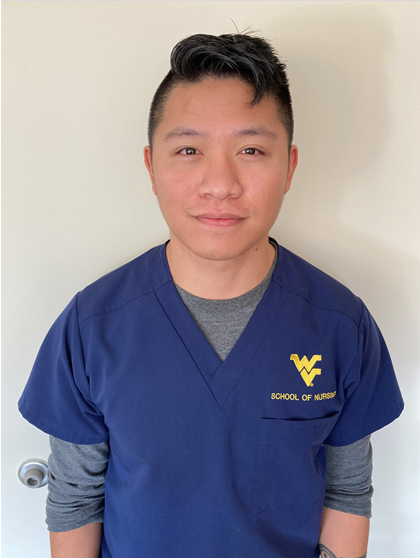
As a veteran, nontraditional student, the thing that I love most about my accelerated-BSN cohort here at the Bridgeport campus is that — for the first time and unlike my first Bachelor's — I don't feel like the odd duck out. Many of my classmates share similar life experiences, have families, and are of a similar age.
Charleston Campus
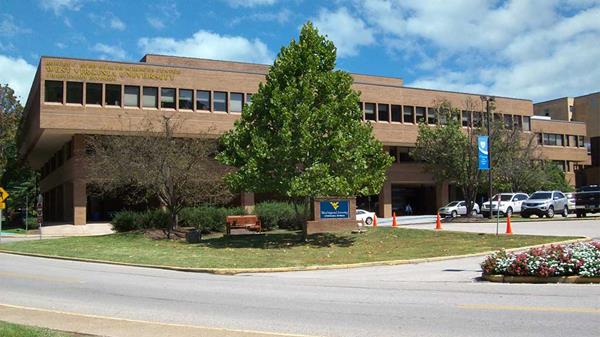
The Charleston Campus offers students in southern West Virginia the ability to more conveniently attend on-campus events and workshops.
The Charleston Division of the WVU Health Sciences Center is a clinical campus of the larger Health Sciences Center in Morgantown. The Charleston Division was formed in 1972 as part of a federal rural health initiative designed to expand health professions’ education beyond the traditional campus. Faculty of the Charleston Division of the School of Nursing participate online with faculty in Morgantown to offer RN-BSN, MSN, DNP, and PhD degrees. Students in southern West Virginia may enroll on the Charleston Campus in order to attend on-campus events and workshops closer to home.
Programs offered at the Charleston Campus
RN to Bachelor of Science
Our 100% asynchronous online RN to BSN program offers licensed registered nurses who are graduates of nationally accredited diploma and associate degree nursing programs the opportunity to complete requirements for the Bachelor of Science in Nursing degree (BSN). Applicants with a current, unencumbered RN license and a minimum overall GPA of 2.5 are encouraged to apply. Applicants with an overall GPA of 2.0 to 2.49 may be considered for provisional admission. In-state tuition rates apply to all RN to BSN students, regardless of residency.
Master of Science in Nursing
The MSN programs at WVU offer baccalaureate-prepared nurses the opportunity to earn a master's degree with part-time or full-time curriculum options. Our current program includes a master’s degree in the FNP (family) nurse practitioner specialty track.

The online program is set up to work at your own pace and it is a blessing to be able to continue your education and be able to work to help your family without losing pay to do so.
Beckley Campus
Students at the WVU School of Nursing Beckley Campus can earn their traditional Bachelor of Science in Nursing (BSN) degree.
A campus within the West Virginia University system, WVU Tech offers more than 30 different academic programs and is located in Beckley. The WVU School of Nursing offers its traditional, four-year Bachelor of Science in Nursing on the Beckley Campus.
The program works closely with Charleston Area Medical Center (CAMC), Thomas Health Systems, Highland Hospital, Raleigh General Hospital, Beckley ARH Hospital, Plateau Medical Center and local agencies to provide clinical training opportunities for nursing students in all years of study.
Programs offered at the Beckley Campus
Bachelor of Science
The Bachelor of Science in Nursing (BSN) program is recognized by health care agencies as providing students with excellent preparation for the nursing profession. Graduates are in great demand and enjoy a large number of career opportunities. Our BSN pass rates for first-time test takers on the national licensure exam in 2023 was 100%.
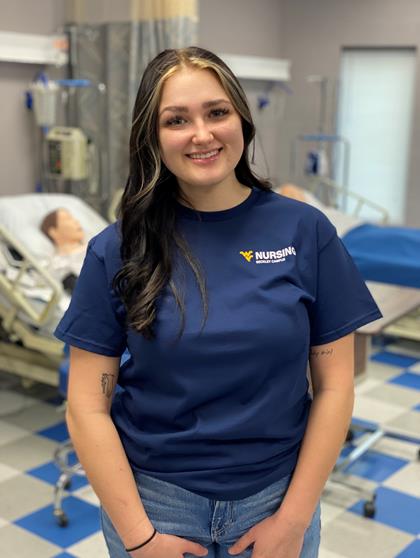
I chose the WVU School of Nursing because it is the most prestigious program in the state. I would not trade my program, classmates, and nursing faculty for anything. If you are looking for a program that is going to invest in you, advocate for your success, and cheer you on throughout your nursing journey, this is the program that will do that.
WVU School of Nursing,
where you are.
The WVU School of Nursing offers several programs through WVU Online.
Online programs
Online. Anytime. Anywhere.
When you choose an online program with the WVU School of Nursing, you can access our high-quality curriculum, expert faculty and numerous resources no matter where you are located. Our programs are tried and tested — our graduates are highly sought after, whether they chose to study in-person or online.
Programs available online
RN to Bachelor of Science
Our 100% asynchronous online RN to BSN program offers licensed registered nurses who are graduates of nationally accredited diploma and associate degree nursing programs the opportunity to complete requirements for the Bachelor of Science in Nursing degree (BSN). Applicants with a current, unencumbered RN license and a minimum overall GPA of 2.5 are encouraged to apply. Applicants with an overall GPA of 2.0 to 2.49 may be considered for provisional admission. In-state tuition rates apply to all RN to BSN students, regardless of residency.
Master of Science in Nursing
The MSN programs at WVU offer baccalaureate-prepared nurses the opportunity to earn a master's degree with part-time or full-time curriculum options. Our current program includes a master’s degree in the FNP (family) nurse practitioner specialty track.
Post-MSN Certificate
The Post-MSN certificate program is offered to professional nurses who have previously earned a master's degree or higher in nursing and who are interested in obtaining national certification in advanced practice nursing. The focus areas are Family Nurse Practitioner (FNP), Psychiatric Mental Health Nurse Practitioner (PMHNP) and Nurse Executive Leadership (NEL).
Doctor of Nursing Practice
The WVU School of Nursing Doctor of Nursing Practice (DNP) program prepares nurses to practice at the highest level of professional nursing. Graduates of the DNP program advance the application of nursing knowledge through the translation and implementation of evidence for practice to improve health outcomes for diverse populations. This expert level practice builds on past advanced practice education, experience, and certification. The DNP program can be completed in as few as 32 credit hours.
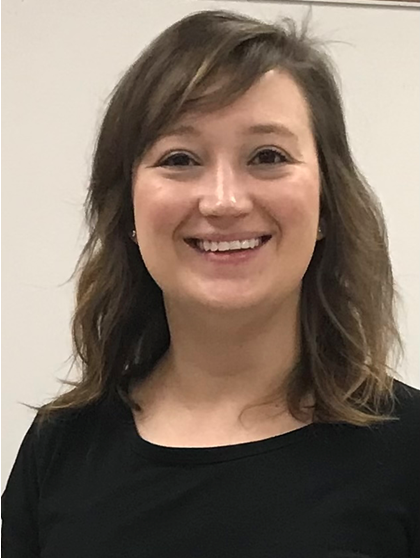
When I got to college, nursing was what I interested in. When I thought about my role models when I was younger, the strongest women I knew were nurses, and I love that caring is one of the most essential elements in being a nurse.



